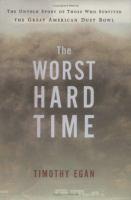
Weather—a fact of nature we all live with. The extremes of this past winter are a hot topic from the news to neighborly conversations. But rarely does weather become such a dominating life force as it did for almost a decade from 1931 to 1939 in the southwest plains—the Dust Bowl. In The Worst Hard Time Pulitzer Prize winner Timothy Egan takes us back to a time we think we know and delves so deeply that we come away with a new respect for the people who lived through the “dirty thirties.”
He begins with a history of the area that covers the Texas and Oklahoma panhandles, western Colorado and western Kansas. This bowl-shaped area of semi-arid land was first inhabited by Native Americans, who were evicted, and then opened to homesteaders who were convinced by both the government and the railroad companies that this almost dessert could sustain farming. This sad account shows how wrong they were. Government policies, world political events and fool-hearty agricultural practices—all man-made mistakes—came together to face the uncontrolled element: weather.
Egan makes the event personal by tracing the lives of several of the families who endured year after year of dust storms that made day as black as night, lost their children's lives to dust pneumonia, and their crops, animals and land to mountains of grit. His descriptions of the homes filled with dirt, filtering through every crack, makes you realize how much we take cleanliness for granted! And while some despaired, most proudly hung on. With little proof, they thought it had to be better next year.
The Worst Hard Time complements the Ken Burns PBS documentary "The Dust Bowl" which visually captures the era with actual footage and interviews of a time that is still painfully fresh to those who survived. While The Grapes of Wrath recounts the haunting tale of those who left the dust bowl, The Worst Hard Time honors the majority of the people who stayed and endured the wind, the poverty and the hopelessness to emerge with a legacy of survival.
